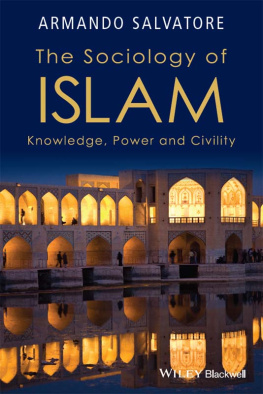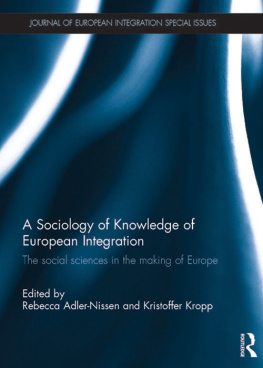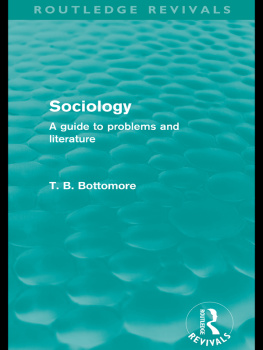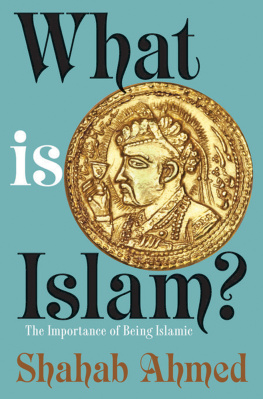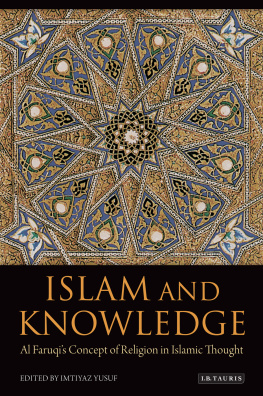
Praise for The Sociology of Islam
A brilliant, pioneering effort to explain the cosmopolitan ethos within Islamicate civilization, The Sociology of Islam encompasses all the terminological boldness of Marshall Hodgson, making the Persianate and Islamicate elements of civic cosmopolitanism, across the vast Afro-Eurasian ecumene, accessible to the widest possible readership in both the humanities and the social sciences.
Bruce B. Lawrence,author of Who is Allah? (2015)
Sociologists of religion have long been awaiting a successor volume to Brian Turner's pathbreaking but now dated Weber and Islam (1974). Armando Salvatore's new book provides just this update and much more. Ranging across a host of critical case studies and theoretical issues, Salvatore provides a masterful account of religious ethics, rationalization, and civility across the breadth of the Muslim world, from early times to today. The result is a book of deep intellectual insight, important, not just for the sociology of Islam, but for scholars and students interested in religion, ethics, and modernity in all civilizational traditions.
Robert Hefner,Boston University
The sociology of Islam has been a late and controversial addition to the sociology of religion. This field of research has been the principal target of the critique of Orientalism and after 9/11 the study of Islam became heavily politicized. Terrorist attacks in Paris and Beirut have only compounded the long-standing difficulties of objective interpretation and understanding. In the first volume of what promises to be a major three-volume masterpiece, Armando Salvatore steers a careful and judicious course through the various pitfalls that attend the field. The result is an academic triumph combining a sweeping historical vision of Islam with an analytical framework that is structured by the theme of knowledgepower. One waits with huge excitement for the delivery of the remaining volumes.
Bryan Turner,City University of New York
THE SOCIOLOGY OF
ISLAM
KNOWLEDGE, POWER AND CIVILITY
ARMANDO SALVATORE
This edition first published 2016
2016 John Wiley & Sons Ltd
Registered Office
John Wiley & Sons Ltd, The Atrium, Southern Gate, Chichester, West Sussex, PO19 8SQ, UK
Editorial Offices
350 Main Street, Malden, MA 02148-5020, USA
9600 Garsington Road, Oxford, OX4 2DQ, UK
The Atrium, Southern Gate, Chichester, West Sussex, PO19 8SQ, UK
For details of our global editorial offices, for customer services, and for information about how to apply for permission to reuse the copyright material in this book please see our website at www.wiley.com/wiley-blackwell.
The right of Armando Salvatore to be identified as the author of this work has been asserted in accordance with the UK Copyright, Designs and Patents Act 1988.
All rights reserved. No part of this publication may be reproduced, stored in a retrieval system, or transmitted, in any form or by any means, electronic, mechanical, photocopying, recording or otherwise, except as permitted by the UK Copyright, Designs and Patents Act 1988, without the prior permission of the publisher.
Wiley also publishes its books in a variety of electronic formats. Some content that appears in print may not be available in electronic books.
Designations used by companies to distinguish their products are often claimed as trademarks. All brand names and product names used in this book are trade names, service marks, trademarks or registered trademarks of their respective owners. The publisher is not associated with any product or vendor mentioned in this book.
Limit of Liability/Disclaimer of Warranty: While the publisher and author have used their best efforts in preparing this book, they make no representations or warranties with respect to the accuracy or completeness of the contents of this book and specifically disclaim any implied warranties of merchantability or fitness for a particular purpose. It is sold on the understanding that the publisher is not engaged in rendering professional services and neither the publisher nor the author shall be liable for damages arising herefrom. If professional advice or other expert assistance is required, the services of a competent professional should be sought.
Library of Congress Cataloging-in-Publication Data
Names: Salvatore, Armando, author.
Title: The sociology of Islam : knowledge, power and civility / Armando Salvatore.
Description: 1 | Hoboken, N.J. : Wiley, 2016. | Includes bibliographical references and index.
Identifiers: LCCN 2016005808 (print) | LCCN 2016006680 (ebook) | ISBN 9781118662649
(hardback) | ISBN 9781119109976 (paper) | ISBN 9781118662625 (pdf) |
ISBN 9781118662632 (epub)
Subjects: LCSH: Islamic sociology. | Civil society Islamic countries. | BISAC: RELIGION / Islam / General.
Classification: LCC BP173.25 .S34 2016 (print) | LCC BP173.25 (ebook) | DDC 306.6/97--dc23
LC record available at http://lccn.loc.gov/2016005808
A catalogue record for this book is available from the British Library.
Cover image: Khaju bridge, Esfahan, Iran. Aurora Photos / Alamy
PREFACE AND ACKNOWLEDGMENTS
The sociology of Islam is an emerging, strategic field of inquiry, teaching, and debate located at the delicate intersection of a variety of disciplines, including sociology, history, Islamic Studies, anthropology, comparative religion, and comparative civilizational analysis. It deals both with conceptual questions and historical interpretations as they originated back in the 1970s, particularly in the pioneering work of Bryan S. Turner and his commentary on Marshall Hodgson's monumental trilogy The Venture of Islam. Covering this field of study is a longer-term undertaking that cannot be completed in one volume. This is why this book was born with an introductory intent and use value.
While the beginnings of the sociology of Islam should be traced back to Bryan S. Turner's Weber and Islam (Turner 1974), my own entry into the field as a scholar goes back to the early 1990s and coincides with the beginning of my PhD dissertation, which I completed at the European University Institute, Florence in 1994 and published in 1997 (Salvatore 1997). Yet my baptism of fire into the sociology of Islam occurred when I taught my first graduate seminar, in the winter of 1995, at Humboldt University, Berlin. The seminar was titled, in a kind of self-indulgent provocation, Is a Sociology of Islam Possible?
Clearly, whatever the sociology of Islam was by the mid-1990s, it still appeared fragile, dependent on scattered contributions and intermittent collaborations among individual scholars. Still absent, or at best latent, was the sense of a nexus between historical and empirical work, on the one hand, and whatever we happen to call theory, on the other. In the summer prior to that graduate seminar, right after my arrival in Berlin, I convened a small panel on the sociology of Islam at an international conference sponsored by the leading social science journal Theory, Culture and Society. The event took place, by sheer coincidence, in Berlin. The journal editor, Mike Featherstone, had months earlier suggested to me that I invite Bryan Turner and Georg Stauth as speakers to the panel. I had never met them before, though I had read a lot of what they had published, including their co-authored works. These included
Next page
